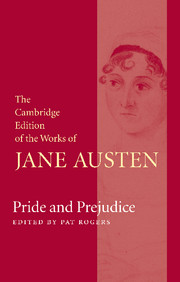Book contents
- Frontmatter
- Contents
- General Editor’s Preface
- Acknowledgements
- Chronology
- Introduction
- Note on the Text
- Pride and Prejudice
- Pride and Prejudice: Volume I
- Pride and Prejudice: Volume II
- Pride and Prejudice: Volume III
- Corrections and Emendations to 1813 text
- Appendix 1 Thomas Egerton and the Publication History
- Appendix 2 Legal and Military Background
- Appendix 3 Pemberley and its Models
- Appendix 4 Note on the second and third editions of Pride and Prejudice
- Abbreviations
- Explanatory Notes
Chapter 17
Published online by Cambridge University Press: 19 December 2020
- Frontmatter
- Contents
- General Editor’s Preface
- Acknowledgements
- Chronology
- Introduction
- Note on the Text
- Pride and Prejudice
- Pride and Prejudice: Volume I
- Pride and Prejudice: Volume II
- Pride and Prejudice: Volume III
- Corrections and Emendations to 1813 text
- Appendix 1 Thomas Egerton and the Publication History
- Appendix 2 Legal and Military Background
- Appendix 3 Pemberley and its Models
- Appendix 4 Note on the second and third editions of Pride and Prejudice
- Abbreviations
- Explanatory Notes
Summary
ELIZABETH related to Jane the next day, what had passed between Mr. Wickham and herself. Jane listened with astonishment and concern;—she knew not how to believe that Mr. Darcy could be so unworthy of Mr. Bingley's regard; and yet, it was not in her nature to question the veracity of a young man of such amiable appearance as Wickham.— The possibility of his having really endured such unkindness, was enough to interest all her tender feelings; and nothing therefore remained to be done, but to think well of them both, to defend the conduct of each, and throw into the account of accident or mistake, whatever could not be otherwise explained.
“They have both,” said she, “been deceived, I dare say, in some way or other, of which we can form no idea. Interested people have perhaps misrepresented each to the other. It is, in short, impossible for us to conjecture the causes or circumstances which may have alienated them, without actual blame on either side.”
“Very true, indeed;—and now, my dear Jane, what have you got to say in behalf of the interested people who have probably been concerned in the business?—Do clear them too, or we shall be obliged to think ill of somebody.”
“Laugh as much as you chuse, but you will not laugh me out of my opinion. My dearest Lizzy, do but consider in what a disgraceful light it places Mr. Darcy, to be treating his father's favourite in such a manner,—one, whom his father had promised to provide for.—It is impossible. No man of common humanity, no man who had any value for his character, could be capable of it. Can his most intimate friends be so excessively deceived in him? oh! no.”
“I can much more easily believe Mr. Bingley's being imposed on, than that Mr. Wickham should invent such a history of himself as he gaveme last night; names, facts, every thing mentioned without ceremony.—If it be not so, let Mr. Darcy contradict it. Besides, there was truth in his looks.”
“It is difficult indeed—it is distressing.—One does not know what to think.”
“I beg your pardon;—one knows exactly what to think.”
But Jane could think with certainty on only one point,— that Mr. Bingley, if he had been imposed on, would havemuch to suffer when the affair became public.
- Type
- Chapter
- Information
- Pride and Prejudice , pp. 95 - 99Publisher: Cambridge University PressPrint publication year: 2006

